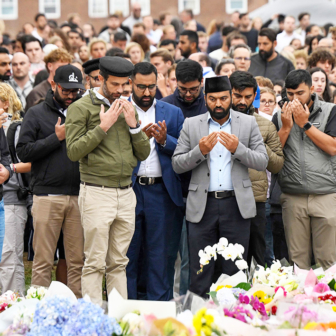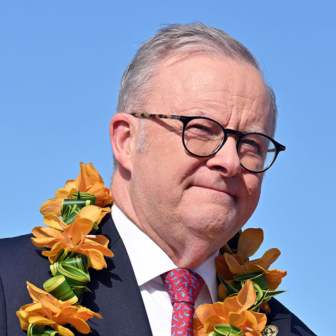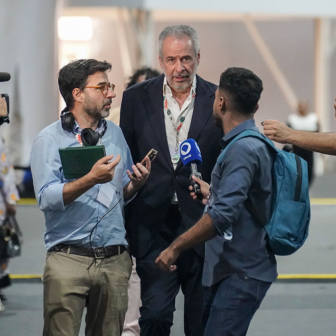If a TV comedy writer were to pitch a new satire about the gap between politicians’ rhetoric about climate change and the reality, she’d surely set it at the annual United Nations climate negotiations and make the host country one of the world’s largest oil producers. Then she’d make the chair of the conference — tasked with achieving a new agreement to reduce emissions — the head of the state oil company, whose day job is to increase fossil fuel consumption. And before the opening credits, for good measure, the chair would be seen using his climate meetings with governments around the world to do oil deals on the side.
This year, though, the series would have to be pitched as a documentary. COP28 opened on Wednesday in the improbable location of Dubai, where futuristic glass towers and a palm-shaped luxury resort raised from the sea cater for the world’s gas-guzzling classes. Dubai is the principal city of the United Arab Emirates, the world’s eighth-biggest oil producer. The head of the UAE’s state-owned oil giant ADNOC, Sultan Al Jaber, is the person its government has appointed to be president of the UN climate conference. And last week the BBC published leaked briefing notes for Al Jaber’s meetings with twenty-seven countries over the past year revealing that, as well as discussing the COP negotiations, he was pursuing energy investment deals for ADNOC and another UAE investment company he heads, Masdar.
For the climate NGOs this was merely confirmation that the UAE should not have been made host of the COP in the first place, and that Al Jaber was a completely inappropriate person to preside over it. “A brazen conflict of interest,” said Amnesty International, calling for him to resign.
But there was never any chance of that, and most of the country delegates in Dubai have reacted to the revelations with a world-weary shrug. “So the UAE is pursuing its oil interests?” said one. “And your point is…?”
The UAE’s energy interests overseas are large. The Financial Times estimates that it has invested almost US$200 billion in energy projects in the United States, Africa, Asia and Europe in the last year alone. Around half of this is in oil and gas, including for a major expansion of new drilling. This blatantly ignores the International Energy Agency’s warning that meeting the agreed goal of limiting global warming to 1.5°C above pre-industrial times effectively means no more fossil fuel exploration. The UAE’s plans alone will blow the global “carbon budget” out of the water.
The UAE argues that the finger of blame is being pointed in the wrong direction: it is merely responding to demand. On all realistic projections, countries will still be using oil and gas till well into the mid-century, and the UAE’s is the cheapest and among the least polluting.
And look at the other half of the UAE’s energy deals, adds Al Jaber: huge new solar, wind and geothermal investments helping provide power and air conditioning to developing and emerging economies from Azerbaijan to Zambia, China to Turkey. For many poorer countries, the UAE’s investments are critical — and far larger than anything they receive from Western governments or private sector companies. You don’t hear many developing country delegates criticising the UAE here.
Yet the revelations about Al Jaber’s Janus-like activities in the run-up to COP28 can’t be wholly dismissed. The UN rules are clear: the COP president must be neutral and impartial, and must not act to further their own interests. In Dubai over the next two weeks probably the single most contentious issue on the agenda will be the future of fossil fuels.
A distinctive feature of this year’s COP will be the “global stocktake.” This is one of the key processes set out in the landmark Paris climate agreement of 2015. Every five years, the agreement says, countries must take stock of their progress, or otherwise, over the last five, and set out global ambitions for the future. In this way the stocktake should inform the Nationally Determined Contributions, or NDCs, countries must make two years later, in which they must each set out new and stronger emissions reduction targets. The next round of NDCs is due in 2025.
Over the past year the global stocktake negotiations have been fraught. Climate scientists have made it very clear that collectively the world is not remotely on track to hold the global temperature rise to 1.5°C. In its annual report on the emissions gap, the UN Environment Programme observes that the difference between the emissions trajectory the world needs to be on for 1.5°C and the one it actually is on has widened rather than narrowed.
Last year it looked as if countries’ plans would take the world to around 2.6°C of warming; today it is probably 2.9°C. At that level much of the world’s agricultural output and water supplies will be at serious risk of failing, the incidence of extreme weather events regularly catastrophic, and large numbers of species would be wiped out. Countries’ current plans for emissions in 2030, UNEP says, need to be cut by another 42 per cent to be on a 1.5°C-compatible pathway.
The stocktake negotiators have focused on the future rather than dwelling on past and present failures. Everyone agrees there should be more investment in renewable energy: COP28 is likely to set a new goal of tripling global renewables capacity by 2030. That will not be easy: solar and wind power are being installed around the world at record rates, but market forecasts currently expect capacity only to double by then.
The COP will also agree on a doubling in the rate of energy efficiency improvements. Energy efficiency has long been the cheapest way of cutting emissions — the International Energy Agency describes it as the “first fuel” — but has always been something of the Cinderella of energy policy, requiring regulatory tightening in many different sectors. Doubling the rate of global improvement will require accelerated innovation in heat pumps, vehicles, consumer goods and industrial processes.
COP28 may well also reach an agreement on methane. Methane is one of the most potent greenhouse gases, more powerful as a cause of warming than carbon dioxide. It is produced by livestock, by waste disposal and as a by-product of fossil fuel production. Here the UAE is playing up its status as an oil giant. Only a country like his, says Al Jaber, can bring the global oil and gas sector to the COP table. Expect a historic announcement of a new tough methane target for 2030, and the major oil and gas companies — traditional opponents of climate policy, and enemies of the climate movement — pledging their support.
As ever, though, it won’t be the things that everyone can agree on, however important, that will dominate negotiations. The major battle this year will be over what the COP says about the future of the fossil fuel industry itself.
The small island states and other nations most vulnerable to climate impacts are insisting on the science. The goal of 1.5°C means reducing carbon emissions to net zero by sometime before 2050. That means ending fossil fuel use more or less entirely. (“Net” zero allows some residual emissions, but only if they are captured and stored, either by increased vegetation or geologically.) So COP28 should agree that fossil fuels must be phased out.
The European Union, with its strong pro-climate-action lobby, is sympathetic. But for China, India, the United States and Saudi Arabia it is a step much too far. They want the text to say merely that fossil fuels should be “phased down,” not out. They also want this to cover only “unabated” fossil fuels: if coal, oil and gas plants are fitted with carbon capture and storage technology to capture the emissions and bury them underground, then they should be exempt from the phase-down.
With the two groups of countries so far apart, agreeing on the text will be very difficult. So the question being asked is: will the UAE be a neutral and impartial chair of the negotiations on this crucial issue? Many observers think it is hard to believe so. Al Jaber is only COP president for a year; he will be chief executive of ADNOC for much longer. The interests of the UAE are not exactly a secret. So expect another bruising conclusion to the conference, we are told, with NGOs crying foul, and the negotiations running acrimoniously into extra time, as they so often do (last year by nearly two whole days).
But there’s another possibility. Al Jaber is a deal-maker. That’s what he does in the day job, and what he’s been doing at those meetings over the last year. He wants to show that this is what you get with a serious player from a serious oil state. So he’ll find some clever new wording to bridge the gap between “phasing out” and “phasing down,” acknowledging that the use of fossil fuels will no doubt come to an end, eventually, but in the meantime they are needed to help the world’s poor escape their poverty. And then he’ll bring the gavel down on a successful COP before, not after, the scheduled end.
In fact, he’s shown what he can do already. The first day of a COP normally manages to do no more than agree on the agenda — and that often takes hours of wrangling in itself. But the first day of COP28 on Wednesday ended with an unprecedented agreement on one of the most significant issues of the entire two weeks.
Developing countries have been arguing for years for a fund to compensate them for the “loss and damage” climate change is now inflicting on their economies. Last year they won the fund — but it had no money in it, and everyone expected the negotiations about how it was to be organised to last several more years. Yesterday, though, the UAE pulled a remarkable rabbit out of the conference hat. Not just an agreement on the arrangements for the fund, but US$440 million of financial pledges to it — including US$100 million from the UAE itself.
Curmudgeons noted that these sums are not nearly enough — the economic costs of loss and damage already run into the billions, and with the UAE’s oil revenues having soared last year to almost US$100 billion a group of former world leaders led by Gordon Brown urged it only this week to provide US$3 billion for climate change. In comparison, US$100 million is small beer.
But Al Jaber didn’t look too worried at the press conference closing the day. He had pulled off a stunning coup, developed and developing nations alike expressed themselves delighted, and the UAE was in its rightful place. •




